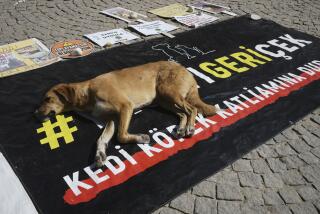Quake Testing Turks’ Beliefs
KORFEZ, Turkey — Touring the wreckage of this summer’s killer earthquake, Turkish journalist Sukran Soner found herself in a taxi with an angry driver who blamed her for the disaster and the deaths of his two children.
Like 97% of Turkey’s population, Soner calls herself a Muslim; she prays, and during Ramadan she fasts. But she doesn’t cover her head in public, as more observant Muslim women do, and that was enough to send the driver into a tirade.
“It’s because of people like you that Allah has punished Turkey and taken my children!” she recalls him exploding. “Allah should punish you!”
Tossing him a wad of bills, the journalist fled, but the driver pursued her and threatened to run her over. “I will take revenge. If I crush you, no one will notice, and Allah will forgive me.”
Soner, who described the incident in the Turkish newspaper Cumhurriyet and in an interview, stood her ground. “I am not the contractor who cheated on iron and cement when he built your apartment,” she told the driver. “I am not the mayor who allowed him to build on unstable ground. Allah punished you for your own stupidity.”
Turks are a God-fearing people and generally concur that the Almighty had something to do with the Aug. 17 cataclysm, which claimed more than 17,000 lives. But as the argument in the taxi made clear, the quake has tried their Islamic faith. So far, Islam has been unable to offer an explanation for the disaster that can be accepted by all parts of Turkish society.
As a foundation of their culture, Islam helps shape the way Turks see the world. But here in Turkey’s quake-stricken industrial northwest, Islam is a fragmented lens--one that reflects fissures between fundamentalists and more tolerant Muslims in this officially secular state.
Many Now Look to Science, Lawyers
Turkish Muslims have been disagreeing since the quake on whether Allah meant it to punish the unfaithful or merely to test humanity in some way; whether his motive, if there was one, is knowable at all; and whether human beings have it within their power to keep out of harm’s way.
Attendance at Friday prayers in mosques has boomed throughout the stricken zone as Turks seek answers and consolation in prayer.
But many Turkish Muslims, observant and not so observant, have abandoned their passive acceptance of fate and turned to scientists, lawyers and architects for advice--much of it dispensed on television talk shows whose popularity has soared since the quake.
In fact, public debate about the quake has been shaped less by the Koran than by civil law as thousands of quake survivors sue builders and public officials for the substandard construction that is blamed for the staggering toll.
“This notion of fate, that whatever will happen will happen and there’s nothing you can do about it, is not unique to Islam, but is ingrained in Islamic cultures like ours,” said Binnaz Toprak, a political scientist at Istanbul’s Bosporus University. “The earthquake has broken that, to a great extent.”
In interviews nearly two months after the 7.4-magnitude quake, Turks made homeless by the disaster say they are still trying to understand what happened, even as fatal aftershocks as strong as magnitude 5.8 keep reminding them of how fragile life can be.
Among the hundreds gathered here on a recent Friday for midday prayers was Abdul Celil Cesur, 18. The student said the number of worshipers, especially young people, was as least as high as it is during the holy month of Ramadan, which falls early in the calendar year.
“When the quake came and people lost everything, they changed their priorities and gave more importance to doing things to ensure eternal life,” he said. “They realized that this is not something to be put off until tomorrow.”
“I never felt death so close,” said Ahmet Ozcan, a 19-year-old mechanic whose home was destroyed. “Now I feel more secure and can sleep better when I come here [to] pray.”
Aid agencies affiliated with fundamentalist Islamic sects have offered another source of comfort by supplying food, clothing, blankets and other relief supplies to many of the quake victims.
The government, fearing an upsurge in fundamentalism, has tried to limit their activity, monopolize the aid and control what imams preach. But mosque-goers are hearing different messages.
Reading the story of Noah and the flood, an imam in the nearby town of Derince told worshipers that floods, quakes and other natural disasters are a form of divine intervention. “When people practice adultery or oppression, the Earth rebels, prays to God and then shakes,” he said. “This will continue until God deals a fatal blow to these people.”
Islamist publications and other imams have echoed this view, claiming that the quake, which destroyed a major naval base in Golcuk, was punishment for a continuing military-led crackdown on Islamist political movements and curtailment of Islamic religious education in the schools.
The head of Turkey’s religious affairs directorate, Mehmet Nuri Yilmaz, has instructed imams, who receive government salaries, to refrain from such interpretations because they “contradict the Islamic faith” and harm relations with the armed forces.
Most imams, following his guidance, have portrayed the quake more vaguely as a “time of testing,” a phrase that invites discussion of human fault in the collapse of poorly constructed apartment buildings.
“Some imams are saying that Allah gives order to the system but does not make day-to-day decisions, while others preach that he sometimes orders angels to intervene,” said Korkut Ozal, head of the Islamic foundation Akoz in Istanbul. “Some of the latter say he intervenes in response to certain human behavior, others say no. In Islam these are open questions.”
A nationwide opinion survey of 3,000 people taken early this year underscores what some political scientists call a popular longing for a more tolerant, pragmatic form of Islam in Turkey.
In the survey, conducted by Toprak and a Bosporus University colleague, 23% of respondents said developments in modern science make some things written in the Koran less credible, and 35% said the Koran should be reinterpreted according to modern conditions.
Large majorities said you could still be a good Muslim even if you drank, did not fast, did not pray five times daily or, if you were a woman, did not cover your head in public. Up to 20% favored some elements of fundamentalism, but nine in 10 said differences among Muslims over religious views should be respected.
Perhaps to satisfy popular demand, practical advice on earthquakes is creeping into the realm of religion. It has become a popular adage that the Koran instructs believers not to stand still when the earth shakes but to take at least two steps to avoid harm even though religious scholars say nothing of the kind is written in the holy book.
Mustafa Bektas, the imam at the Yanuz mosque in this oil-refining town, is among those who preaches that the quake was divine punishment, but he says that he couples that sermon with one on the need for strict observance of building codes in seismic areas.
You can hear the full range of views in the tent city where 1,250 people made homeless by the quake camp behind Korfez’s main supermarket. But the prevailing emotion is anger at the people who built their homes.
Mukhades Zeren, a Muslim woman who covers her head, says she has prayed to understand why her son and his bride of one month died in the quake and has reached a simple conclusion.
“I don’t know why the Earth shook; maybe it was destiny,” she said. “But my son’s death is the fault of the builders.”
More to Read
Sign up for Essential California
The most important California stories and recommendations in your inbox every morning.
You may occasionally receive promotional content from the Los Angeles Times.










